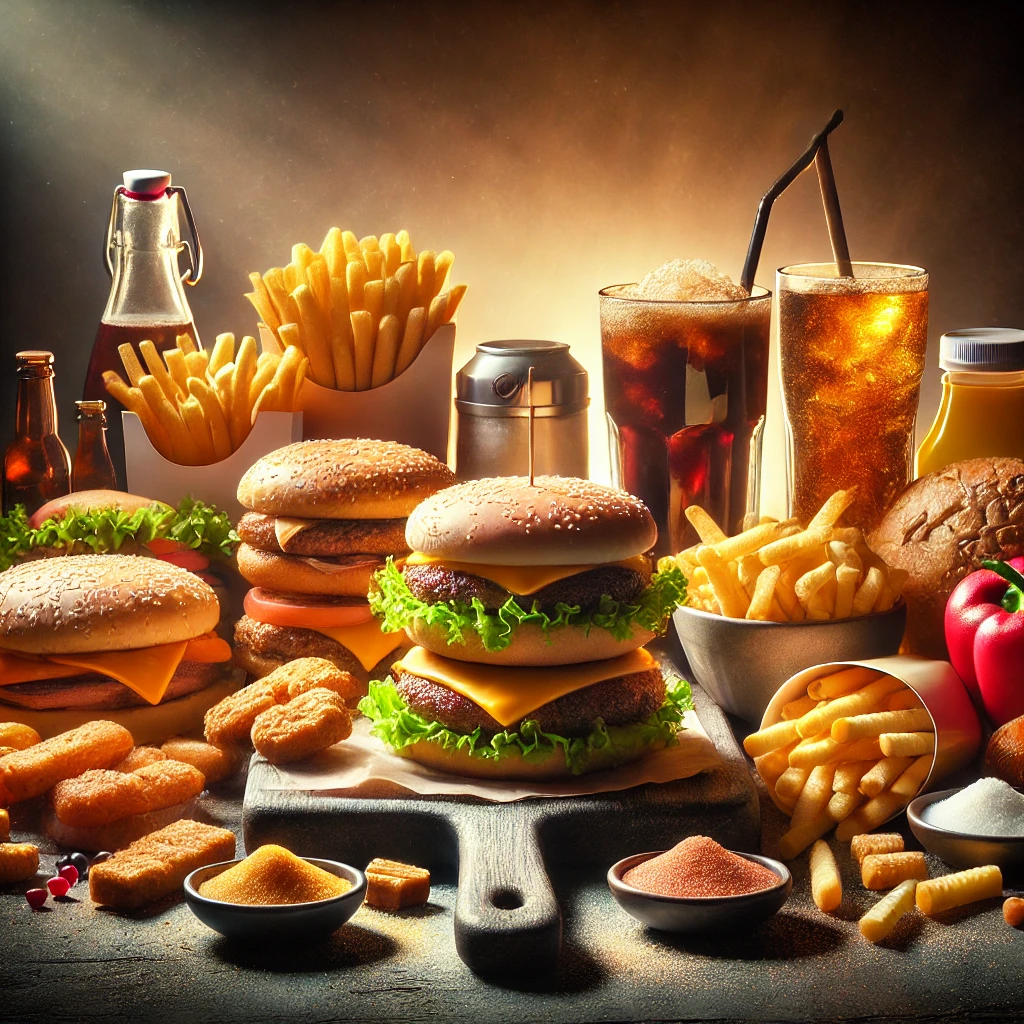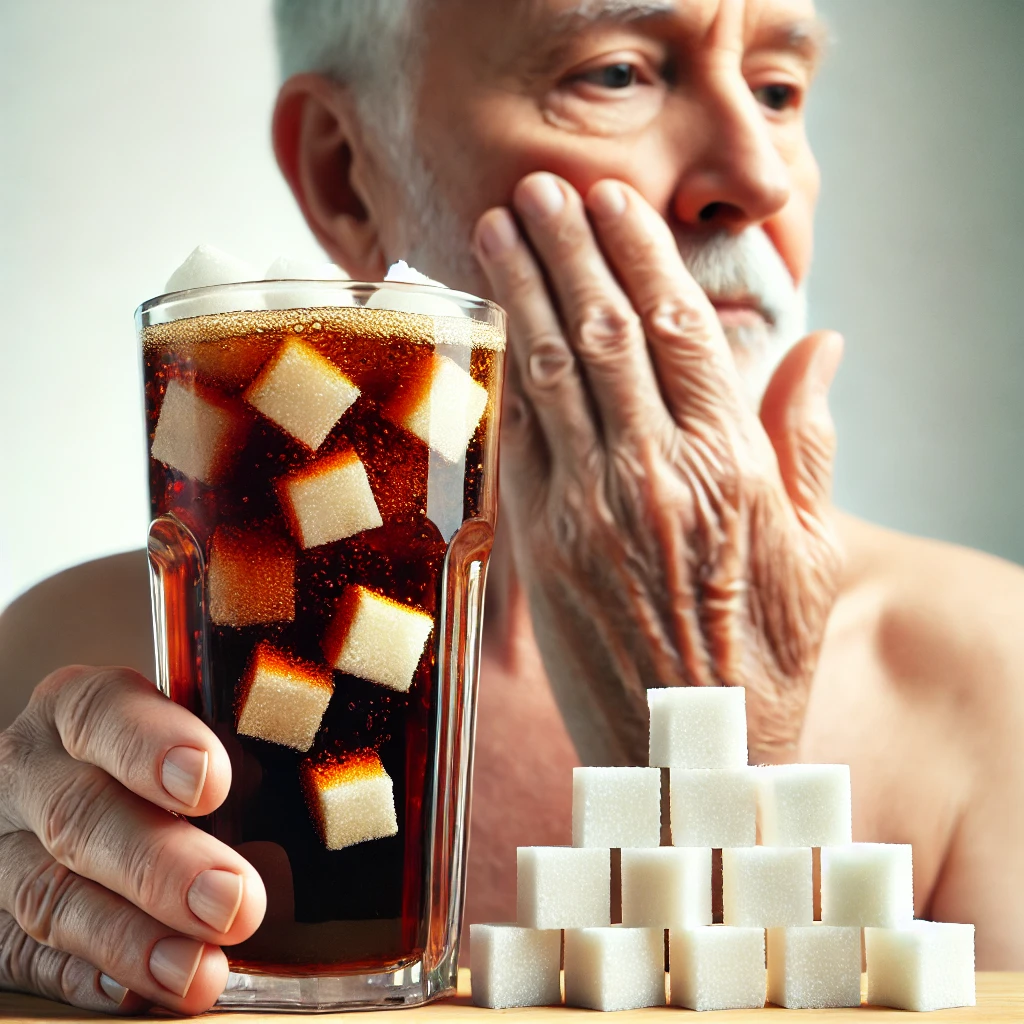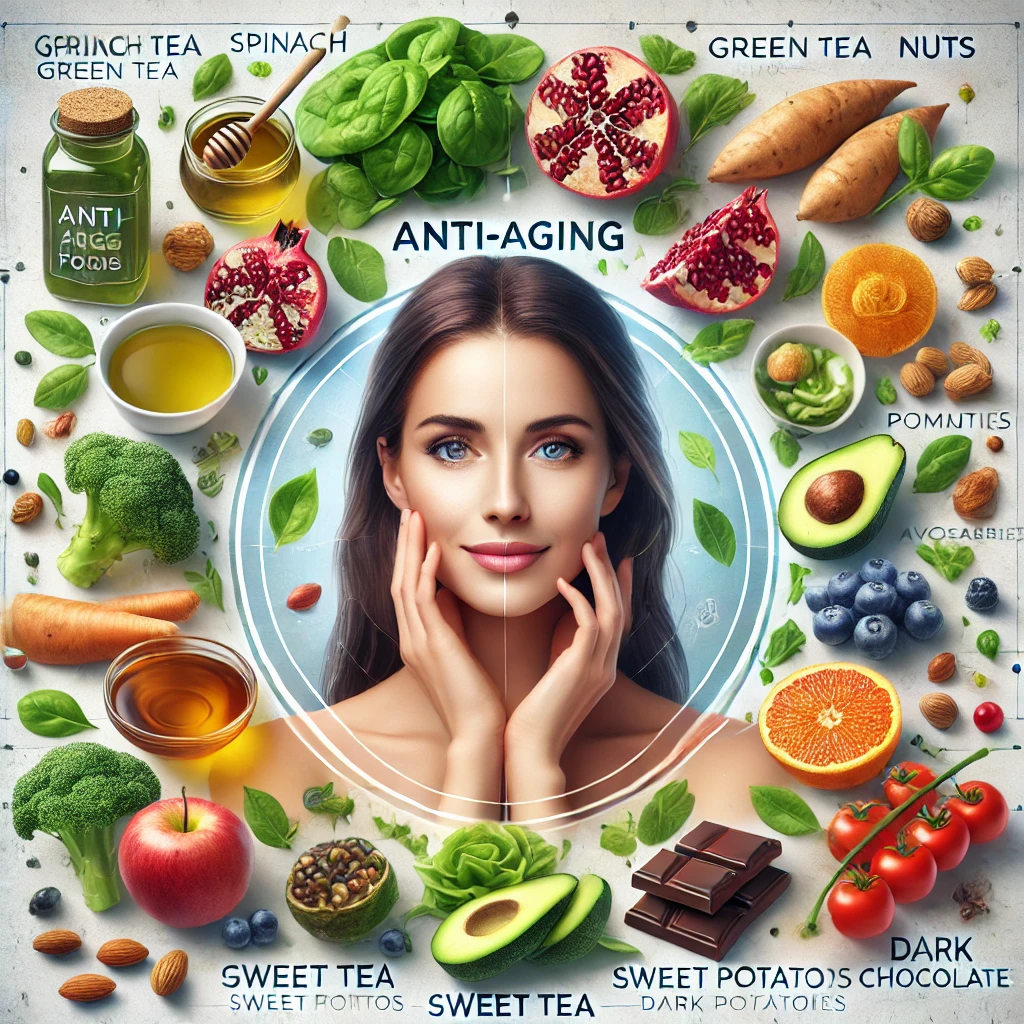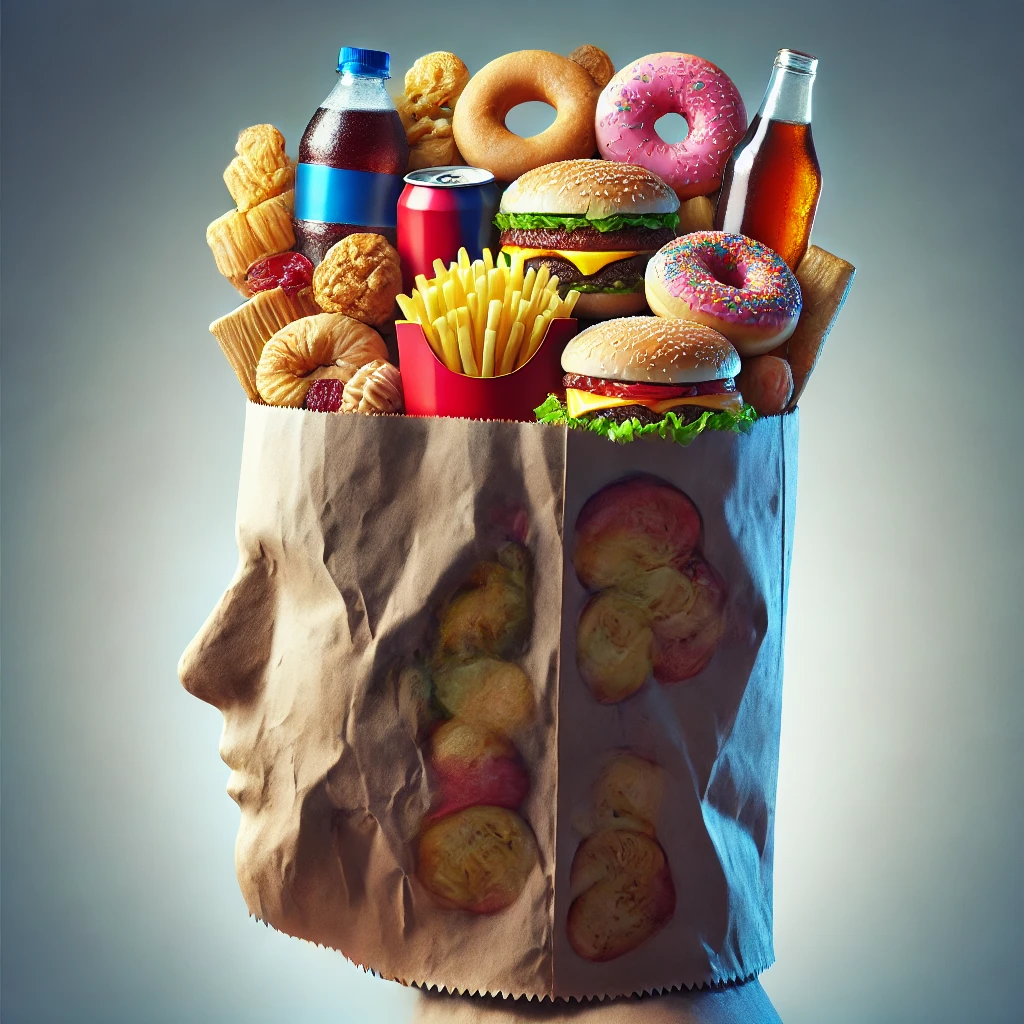The Hidden Cost of Convenience
In today’s fast-paced world, ultra-processed foods have become a staple. They offer convenience, long shelf life, and flavors that keep us reaching for more. However, beneath this convenience lies a hidden cost—our health. Recent studies show that ultra-processed foods (UPFs) do more than add empty calories; they accelerate aging. This article explores how UPFs impact our skin, metabolism, and overall biological aging and offers tips for adopting a diet that slows down the aging process naturally.
What Are Ultra-Processed Foods?
Ultra-processed foods go through multiple stages of industrial processing, transforming natural ingredients into forms that often bear little resemblance to their original state. Typical examples include:
- Sugary snacks and desserts
- Packaged meals and instant noodles
- Fast food items like burgers and fries
- Carbonated sugary drinks and juices
- Processed meats like sausages and deli meats

Unlike whole foods, ultra-processed foods are laden with preservatives, artificial colors, sweeteners, and stabilizers, which make them shelf-stable, highly palatable, and addictive. Unfortunately, these same ingredients contribute to metabolic disruptions, inflammation, and cellular aging.
The Science Behind Aging and Ultra-Processed Foods
The human body ages through two primary mechanisms: chronological aging, which reflects the passage of time, and biological aging, which accounts for the actual health and condition of cells, tissues, and organs. Biological aging can be influenced by factors such as diet, lifestyle, and environmental exposure.
Research on Ultra-Processed Foods and Biological Aging
Recent research links high UPF consumption with markers of accelerated biological aging. UPFs drive biological aging by causing oxidative stress, which damages cellular DNA and disrupts normal metabolic functions. Here’s how:
- Oxidative Stress and Free Radicals
UPFs contain high levels of sugars, unhealthy fats, and additives that produce free radicals. These reactive molecules damage cell structures, leading to oxidative stress, a key factor in accelerated aging. - Inflammation
UPFs are known to trigger inflammatory responses in the body. Chronic, low-grade inflammation disrupts normal cell function, contributing to conditions like insulin resistance, obesity, and cardiovascular disease, all of which speed up the aging process. - Impaired Gut Health
Gut health is closely tied to longevity. Ultra-processed foods disrupt the balance of beneficial gut bacteria, impairing digestion and nutrient absorption. Poor gut health is linked to skin issues, fatigue, and cognitive decline, all markers of accelerated aging.

How Sugar in Processed Foods Ages the Skin
Skin health is a visible indicator of aging, and ultra-processed foods directly impact skin appearance and elasticity through their high sugar content. Glycation is a chemical process that occurs when excess sugars bind with proteins, damaging collagen and elastin—two proteins that keep the skin firm and youthful.
Visible Effects of Sugar on Skin Aging
- Wrinkles and Fine Lines
As collagen breaks down, the skin loses its firmness, causing fine lines and wrinkles to appear prematurely. - Loss of Elasticity
Damaged elastin fibers reduce skin elasticity, leading to sagging and a dull, aged appearance. - Dullness and Uneven Texture
The glycation process also causes skin discoloration and uneven texture, making skin look tired and older.
Health Tip: To support youthful skin, reduce your intake of sugary snacks, soft drinks, and processed desserts. Opt for natural sweeteners like honey or stevia, which do not cause the same level of glycation.
Biological Aging vs. Chronological Aging: Why It Matters
While we can’t slow chronological aging, we have some control over biological aging. Biological age reflects the condition of our cells and systems, and ultra-processed foods are significant contributors to premature aging.
Key Differences Between Biological and Chronological Aging
- Chronological Aging is purely based on the number of years a person has lived.
- Biological Aging considers cellular and organ health, which can make a person appear older or younger than their chronological age.
A person who consumes a high amount of ultra-processed foods may appear biologically older than someone of the same chronological age who eats a balanced, whole-food diet. Reducing UPFs and adding nutrient-rich foods can improve biological age, preserving vitality and reducing age-related health risks.
How Processed Foods Affect Gut Health and Accelerate Aging
The gut microbiome is home to trillions of beneficial bacteria that support immune function, nutrient absorption, and even mental health. Ultra-processed foods disrupt this delicate ecosystem by feeding harmful bacteria and starving beneficial ones, leading to digestive issues, reduced immunity, and increased inflammation.

Gut Health and Its Impact on Aging
- Poor Nutrient Absorption: Processed foods lack the fiber needed for a healthy gut environment, impairing the absorption of anti-aging nutrients like vitamins A, C, and E.
- Increased Inflammation: Harmful gut bacteria release toxins that can trigger inflammation, accelerating aging.
- Mental Health and Cognitive Decline: The gut-brain connection is essential for cognitive health. Disrupted gut health from processed foods can lead to mood disorders, memory issues, and cognitive aging.
To support gut health and slow aging, prioritize foods high in fiber, like whole grains, fruits, and vegetables. Incorporating fermented foods like yogurt, kefir, and sauerkraut also supports a healthy gut microbiome.
Foods That Naturally Slow Down Aging
The good news is that replacing ultra-processed foods with natural alternatives can help reverse some of the damage and slow down aging. Here’s a list of foods with anti-aging benefits:
- Berries
Berries are high in antioxidants, which protect the skin and body from free radical damage. They are particularly rich in vitamin C, which promotes collagen production for healthy skin. - Leafy Greens
Kale, spinach, and Swiss chard are full of vitamins A and C, which support skin health and immune function. Leafy greens also contain compounds that support cellular repair. - Nuts and Seeds
Walnuts, chia seeds, and flaxseeds are loaded with omega-3 fatty acids, which support skin hydration, elasticity, and overall heart health. - Avocado
Avocados provide healthy fats and vitamin E, which help maintain skin moisture and prevent signs of aging. - Green Tea
Green tea is rich in polyphenols, which slow down aging by protecting cells from oxidative stress. Regular consumption can help improve skin tone, reduce inflammation, and protect against age-related conditions.

The Reverse Aging Diet: What It Looks Like
A reverse aging diet is not about restriction but about making smarter choices that support cellular health, reduce inflammation, and promote vitality. Here’s how to build a reverse aging diet:
- Focus on Whole Foods
Emphasize whole grains, fresh vegetables, lean proteins, and healthy fats. Whole foods are nutrient-dense, providing the body with essential vitamins and minerals. - Reduce Sugar and Salt
Choose natural sweeteners, limit sugary drinks, and avoid excessive salt intake. Reducing sugar can improve skin health and prevent glycation-related aging, while moderate salt intake supports cardiovascular health. - Add More Healthy Fats
Foods like fatty fish, olive oil, and nuts are rich in omega-3 fatty acids, which reduce inflammation and keep skin smooth and supple. - Hydrate Well
Water is crucial for maintaining skin elasticity and supporting all body functions. Proper hydration also aids digestion and detoxification. - Include Fermented Foods
Fermented foods like kimchi, kombucha, and yogurt introduce beneficial bacteria into the gut, improving digestion and reducing inflammation, which is critical for healthy aging.
Practical Tips for Reducing Processed Foods in Your Diet
Transitioning away from ultra-processed foods can seem daunting, but with gradual steps, it’s entirely achievable. Here are practical ways to reduce UPFs in your diet:
- Plan Your Meals
Preparing meals in advance reduces reliance on convenient processed options. Batch-cooking healthy meals for the week ensures you have nourishing food on hand. - Shop Smart
When grocery shopping, avoid aisles with processed snacks and focus on fresh produce, whole grains, and lean proteins. - Read Labels Carefully
Look for ingredients you recognize and avoid those with artificial additives, high sugar content, or excessive sodium. Choose products with short ingredient lists. - Start Small
Replace one processed food each day with a whole-food alternative. For example, swap sugary cereals with oatmeal or a fruit smoothie. - Cook at Home
Home-cooked meals are often healthier and free from hidden additives found in restaurant or pre-packaged meals. Cooking at home also allows for better portion control and food quality.
Real-Life Benefits of Reducing Ultra-Processed Foods
People who reduce UPF intake often report higher energy levels, improved skin texture, better digestion, and mental clarity. Healthier eating habits can reduce the risk of chronic diseases like diabetes, cardiovascular disease, and certain cancers, which are often exacerbated by high consumption of processed foods.
Case Study: The Blue Zones
In Blue Zones—regions where people live longer, healthier lives—processed food consumption is minimal. Diets are primarily plant-based, featuring whole grains, vegetables, and healthy fats. Residents of these regions experience lower rates of chronic illness and maintain youthful health well into old age.

Protecting Your Health from the Inside Out
- Limit Ultra-Processed Foods
Reducing UPFs can have immediate benefits for energy levels, skin health, and longevity. The fewer processed foods you consume, the less strain on your body’s metabolic and immune systems. - Embrace Whole, Nutrient-Dense Foods
Eating a diet rich in fruits, vegetables, lean proteins, and whole grains provides the nutrients necessary to combat aging and support long-term health. - Hydrate and Exercise Regularly
Hydration and regular physical activity play crucial roles in maintaining skin elasticity, cardiovascular health, and mental well-being. - Monitor Sugar Intake for Skin and Overall Health
Reducing sugar can help improve skin elasticity, reduce inflammation, and protect against cellular aging caused by glycation.
Choosing Health and Vitality
By reducing your intake of ultra-processed foods and incorporating a reverse aging diet, you can protect your body from premature aging and enjoy a healthier, more vibrant life. While the convenience of UPFs is undeniable, the long-term benefits of a whole-food, nutrient-dense diet far outweigh the ease of pre-packaged meals. Make small, sustainable changes today to build a healthier tomorrow.
Visit our other website: aibrainpowered.com












